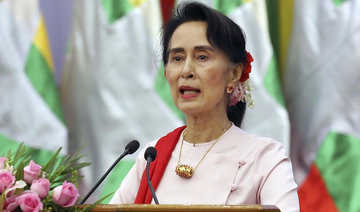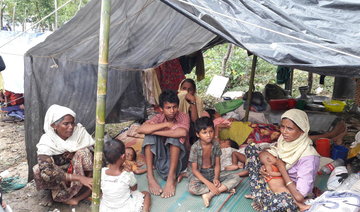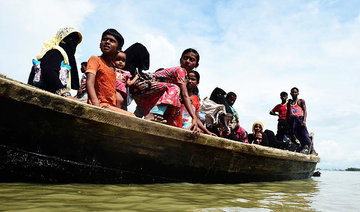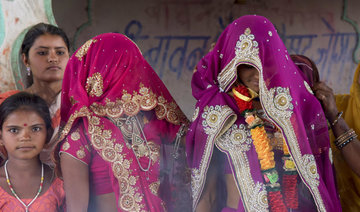BANGKOK: As Rakhine state burns and Rohingya flee, Aung San Suu Kyi is preparing to address Myanmar on the crisis for the first time — a high wire act seeking to soothe global outrage without baiting an army that is again showing its teeth.
Suu Kyi took office last year as Myanmar’s first civilian leader after 50 years of junta rule.
She has since focused her energy on the delicate political dance between her civilian government and the generals who still hold many of the levers of power.
On Tuesday the Nobel laureate will give the biggest speech of her time in office.
The nationally-televised turn will break a near silence since the ulcerous ethnic and religious hatreds in western Rakhine state erupted into killings on August 25, sending 400,000 Muslim minority Rohingya fleeing into Bangladesh.
Some 30,000 ethnic Rakhine Buddhists and Hindus have also been internally displaced.
In an interview with the BBC, UN Secretary General Antonio Guterres said the stakes were high for Tuesday’s speech, calling it a “last chance” to stop the unfolding humanitarian calamity.
“If she does not reverse the situation now, then I think the tragedy will be absolutely horrible, and unfortunately then I don’t see how this can be reversed in the future,” he said.
The latest violence was sparked by Rohingya militants’ raids on 30 police posts in Rakhine state.
The UN calls the army fightback a “textbook example of ethnic cleansing” with villages set ablaze to drive Rohingya civilians out.
Many abroad are puzzled as to how rights can be flagrantly denied to a specific group by a people who once nobly demanded their own in the face of a junta.
Suu Kyi’s televised address — likely at least in part to be in English — comes ahead of a meeting at the UN General Assembly in which Myanmar is expected to be hammered over the crisis.
But analysts say her power to stay the military is limited, and her response thus far indicates she is choosing the lesser of two evils.
“She’s signalling that her chief priority is the relationship between the government and military and that the pogrom is secondary to that,” Francis Wade, author of ‘Myanmar’s Enemy Within: Buddhist Violence and the Making of the Muslim ‘Other” told AFP.
“This obviously raises questions about the quality of leadership she seeks to bring, but also that the political game in Myanmar is worth the sacrifice of entire communities.”
Suu Kyi’s National League for Democracy (NLD) swept the board when the military permitted elections in 2015.
Before they loosened their chokehold on power, the generals wrote themselves into the constitution, embedding their political future with a bloc of legislative seats and total control over security.
Over the last two years, Suu Kyi’s gradualism, and her refusal to upset the organization that kept her under house arrest for almost two decades, has seen the sprouting of the first green shoots of the rule of law in Myanmar.
But the eruption of violence in Rakhine and the pressure from the outside world for her to “do something about it” risks upsetting that balance.
All the more so in a country where the majority of the population shares the military’s view that Rohingya Muslims — whom it disparagingly calls “Bengalis” — are interlopers bent on taking land and resources from Buddhists.
A leader who bends too far to international will could lose the support of the people she governs.
In these circumstances, observers say, it is not hard to imagine another coup by an army that always used national security concerns to justify its iron-fisted rule.
From the ashes of Rakhine, commander-and-chief Min Aung Hlaing is emerging as an unexpectedly popular figure, defying deep mistrust of the military.
Through Facebook and Twitter he has successfully pitched his once reviled institution as the defender of Myanmar’s territorial sovereignty and the Buddhist faith against “extremist Bengali terrorists.”
On Saturday his Facebook feed repeated the widely-held domestic view that the Rohingya have “never been an ethnic group in Myanmar.”
With the army flexing its muscles, Suu Kyi’s next steps have become increasingly treacherous.
A complex swirl of ethnic and religious rivalries, incubated under five decades of military rule, has toxified all debate inside Myanmar around the Rohingya.
The militant attacks of August 25 are seen by many Buddhists as confirmation of long-held fears that overseas-based Islamists are intent on taking over Rakhine state — the western gateway to wider Myanmar.
Fear has overridden empathy for the Rohingya, who still trudge in wretched, hungry lines to Bangladesh.
So far, and despite the global finger-pointing, Suu Kyi remains a galvanizing force in Myanmar.
Her reticence to publically defend the Rohingya has been applauded across the political divide — even by notorious Buddhist nationalist monks.
“She is not your leader. She is OUR leader,” Mayzin Aye, a businesswoman renowned for supporting Suu Kyi, wrote on Facebook — where much of Myanmar’s discourse takes place.
“She is not an icon for us. She is not a Saint for us. She is our country’s leader... She gives up everything for our freedom from military rulers.”
High stakes in Myanmar as Suu Kyi to address Rohingya crisis
High stakes in Myanmar as Suu Kyi to address Rohingya crisis
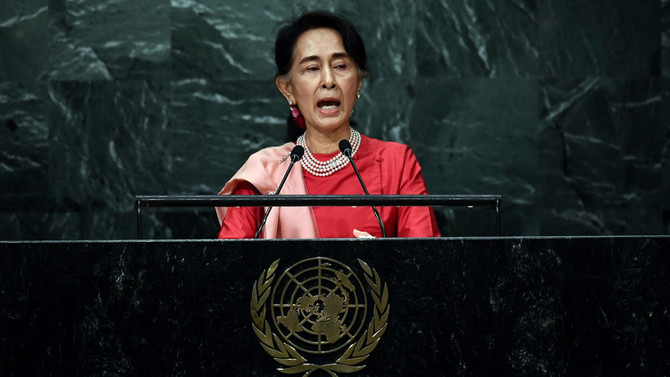
India, Kuwait upgrade ties to strategic partnership on Modi visit

- Modi awarded Order of Mubarak Al-Kabeer for strengthening Kuwait-India relations
- India, Kuwait leaders discussed cooperation in pharmaceuticals, IT, security
NEW DELHI: India and Kuwait upgraded bilateral ties to a strategic partnership on Sunday as their leaders eye stronger cooperation in “key sectors” ranging from pharmaceuticals to security.
Indian Prime Minister Narendra Modi signed a strategic partnership agreement with Emir of Kuwait Sheikh Mishal Al-Ahmad Al-Jaber Al-Sabah during his trip to the Gulf state, the first visit by an Indian leader in 43 years.
“We have elevated our partnership to a strategic one and I am optimistic that our friendship will flourish even more in the times to come,” Modi said in a statement.
“We discussed cooperation in key sectors like pharmaceuticals, IT, fintech, infrastructure and security.”
During the trip, the Kuwaiti emir presented Modi with the Order of Mubarak Al-Kabeer for his efforts in strengthening Kuwait-India relations.
The order is the highest civilian honor in Kuwait and is bestowed upon leaders and heads of state.
The emir said India was a “valued partner” in the country and the Gulf region and that he “looked forward” to India playing a greater role in the realization of Kuwait Vision 2035, according to a statement issued by the Indian Ministry of External Affairs.
The newly upgraded ties will open up “further cooperation in sectors such as defense … with the Kuwaiti armed forces,” especially the navy, said Kabir Taneja, a deputy director and fellow with the strategic studies program at the Observer Research Foundation in New Delhi.
Their closer cooperation in major sectors will also “further India’s economy-first agenda,” he added.
“Pharmaceuticals, for example, is a point of strength of Indian manufacturing and can contribute to further building the sector in states such as Kuwait,” Taneja told Arab News.
India’s pharmaceutical exports have been growing in recent years, and the country was the third-largest drugmaker by volume in 2023.
Delhi is also among Kuwait’s top trade partners, with bilateral trade valued at around $10.4 billion in 2023-24.
Taneja said India-Kuwait ties are also likely to strengthen through the Indian diaspora, the largest expatriate community in the Gulf state.
Over 1 million Indian nationals live and work in Kuwait, making up about 21 percent of its 4.3 million population and 30 percent of its workforce.
“(The) Indian diaspora has been part of the Kuwaiti story for a long time,” Taneja said, adding that strengthening ties between the two countries will allow India, through its diaspora, to unlock “deeper economic cooperation potential.”
Putin vows more ‘destruction’ on Ukraine after drone attack on Russia’s Kazan

- ‘Whoever, and however much they try to destroy, they will face many times more destruction themselves and will regret what they are trying to do in our country’
MOSCOW: Russian President Vladimir Putin on Sunday vowed to bring more “destruction” to Ukraine in retaliation for a drone attack on a high-rise apartment block in the central Russian city of Kazan a day earlier.
“Whoever, and however much they try to destroy, they will face many times more destruction themselves and will regret what they are trying to do in our country,” Putin said in comments on the attack on Kazan — which left no casualties — during a televised government meeting.
France’s most powerful nuclear reactor finally comes on stream

- The Flamanville 3 European Pressurized Reactor in Normandy started providing electricity to French homes on Saturday
- Launch is welcome news for the heavily indebted state-owned energy company EDF after multiple problems extended construction to 17 years
PARIS: France on Saturday connected its most powerful nuclear power reactor to the national electricity grid in what leaders hailed as a landmark moment despite years of delays, budget overruns and technical setbacks.
The Flamanville 3 European Pressurized Reactor in Normandy started providing electricity to French homes at 11:48 a.m. (1048 GMT) Saturday, the EDF power company’s CEO Luc Remont said in a statement.
“Great moment for the country,” President Emmanuel Macron said in a statement on social network LinkedIn, calling it “one of the world’s most powerful nuclear reactors.”
“Re-industrializing to produce low-carbon energy is French-style ecology,” he added. “It strengthens our competitiveness and protects the climate.”
The French-developed European Pressurised Reactor project, launched in 1992, was designed to relaunch nuclear power in Europe after the 1986 Chernobyl catastrophe in Soviet Ukraine, and is touted as offering more efficient power output and better safety.
The EPR, a new generation pressurized water reactor, is the fourth to be finished anywhere in the world. Similar design reactors in China and Finland came online ahead of it.
The launch is welcome news for the heavily indebted state-owned energy company EDF after multiple problems extended construction to 17 years and caused massive budget overruns.
Remont of EDF called the event “historic.”
“The last time a reactor started up in France was 25 years ago at Civaux 2,” he said, referring to the Civaux power plant in southwestern France.
The connection was initially scheduled to take place Friday.
It is the most powerful reactor in the country at 1,600 MW. Ultimately, it should supply electricity to upwards of two million homes.
The connection to the grid “will be marked by different power levels through to the summer of 2025” in a months-long testing phase, the company has said.
EDF said that starting up a reactor was “a long and complex operation.”
The plant will be shut down for a complete inspection lasting at least 250 days, probably in the spring of 2026, the company added.
Construction of the Flamanville reactor began in 2007 and was beset by numerous problems.
The start-up comes 12 years behind schedule after a plethora of technical setbacks which saw the cost of the project soar to an estimated 13.2 billion euros ($13.76 billion), four times the initial 3.3 billion euro estimate.
The start-up began on September 3, but had to be interrupted the following day due to an “automatic shutdown.” It resumed a few days later.
Generation has been gradually increased to allow the reactor to be connected to the electricity network.
Nuclear power accounts for around three-fifths of French electricity output and the country boasts one of the globe’s largest nuclear power programs.
That is in stark contrast to neighboring Germany, which exited nuclear power last year by shutting down the last three of its reactors.
“This morning marks the culmination of a titanic effort that has finally paid off,” Agnes Pannier-Runacher, the outgoing minister for ecological transition, said on X.
“We are drawing all the lessons from this to make a success of the nuclear revival that we decided on with the President of the Republic.”
Macron has decided to ramp up nuclear power to bolster French energy sustainability by ordering six new-generation reactors and laying options for eight more, that could cost tens of billions of euros.
In 2022, he called for a “renaissance” for the country’s nuclear industry to transition away from fossil fuels.
“What we have to build today is the renaissance of the French nuclear industry because it’s the right moment, because it’s the right thing for our nation, because everything is in place,” Macron said at the time.
Pickup truck driver killed by police after driving through Texas mall and injuring 5

- The truck crashed into the department store in Killeen, 109 kilometers north of the state capital Austin
- Emergency medical services transported four victims to area hospitals and another traveled to a hospital separately
KILLEEN, Texas: A pickup truck driver fleeing police careened through the doors of a JCPenney store in Texas and continued through a busy mall, injuring five people before he was fatally shot by officers, authorities said.
The truck crashed into the department store in Killeen, about 68 miles (109 kilometers) north of the state capital Austin, around 5:30 p.m. Saturday and continued into the building, striking people as it went, Sgt. Bryan Washko of the Texas Department of Public Safety said in an evening news briefing.
Emergency medical services transported four victims from the mall to area hospitals and another traveled to a hospital separately. They ranged in age from 6 to 75 years old and their conditions were not immediately known, he said.
The chase began around 5 p.m. on Interstate 14 in Belton, about 20 miles (30 kilometers) from Killeen, after authorities received calls about an erratic driver in a black pickup, Ofelia Miramontez of the Killeen Police Department said.
The driver then pulled off the road and drove into the parking lot of the mall.
“The suspect drove through the doors and continued to drive through the JCPenney store, striking multiple people,” Washko said. “The trooper and the Killeen police officer continued on foot after this vehicle, which was driving through the store, actively running people over. He traveled several hundred yards.”
Officers from the state public safety department, Killeen and three other law enforcement agencies “engaged in gunfire to eliminate this threat,” Washko said.
One of the officers who traded gunfire with the suspect was working as a security guard at the mall and others were off duty, he said.
Washko did not have information about the suspect’s identity at the time of the briefing.
Witnesses interviewed by local news outlets outside the mall said they heard multiple gunshots and saw people fleeing through the mall.
India child marriage crackdown reaches nearly 5,000 arrests

- India is home to more than 220 million child brides, according to the United Nations
- The legal marriage age in India is 18 but millions of children are forced to tie the knot when they are younger
GUWAHATI, India: A crackdown on illegal child marriages in India’s northeast has resulted in nearly 5,000 arrests, after 416 people were detained in the latest police sweep, a minister said Sunday.
“We will continue to take bold steps to end this social evil,” Himanta Biswa Sarma, chief minister of Assam state, said in a statement.
“Assam continues its fight against child marriage,” he added, saying raids have been carried out overnight and that those arrested would be produced in court on Sunday.
India is home to more than 220 million child brides, according to the United Nations, but the number of child weddings has fallen dramatically this century.
Assam state had already arrested thousands in earlier abolition drives that began in February 2023, including parents of married couples and registrars who signed off on underage betrothals.
It takes the total now arrested to more than 4,800 people.
Sarma has campaigned on a platform of stamping out child marriages completely in his state by 2026.
The legal marriage age in India is 18 but millions of children are forced to tie the knot when they are younger, particularly in poorer rural areas.
Many parents marry off their children in the hope of improving their financial security.
The results can be devastating, with girls dropping out of school to cook and clean for their husbands, and suffering health problems from giving birth at a young age.
In a landmark 2017 judgment, India’s top court said that sex with an underage wife constituted rape, a ruling cheered by activists.


